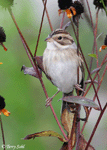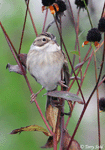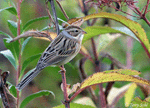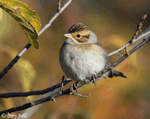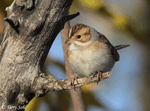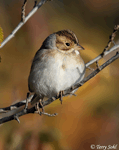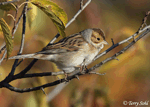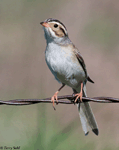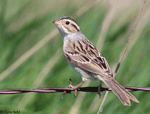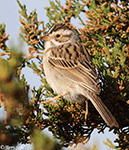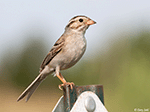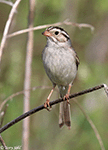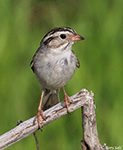| Length: 5.5 inches | Wingspan: 8 inches | Seasonality: Migrant / Summer |
| ID Keys: Brown ear patches with dark outline, white central crown stripe, dark eyeline behind eye (not in front) | ||
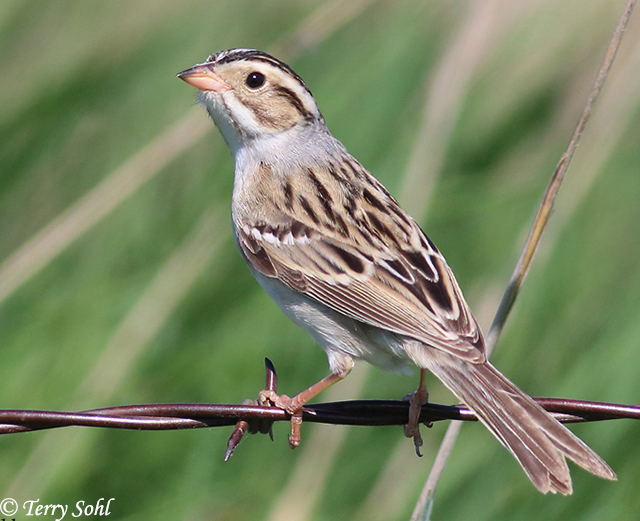 Clay-colored sparrows can be a fairly common sight during the
summer in the northern tier of U.S. states. Males are easily observed as
they sing their buzzy song from a high perch in their territory. They can
sometimes be found in mixed flocks with Chipping
Sparrows or Brewer's Sparrows
(western South Dakota only for the latter), two species that share a general
overall appearance and may be confused with Clay-colored Sparrows, particularly
during fall migration when birds are in non-breeding plumage.
Clay-colored sparrows can be a fairly common sight during the
summer in the northern tier of U.S. states. Males are easily observed as
they sing their buzzy song from a high perch in their territory. They can
sometimes be found in mixed flocks with Chipping
Sparrows or Brewer's Sparrows
(western South Dakota only for the latter), two species that share a general
overall appearance and may be confused with Clay-colored Sparrows, particularly
during fall migration when birds are in non-breeding plumage.
Habitat:
Prefers shrubby grasslands for breeding. This can also include woodland edges, fence lines, and the shrubby understory of forest areas. They also prefer brushy areas during migration and in winter.
Diet:
The major diet item is seeds, which it consumes in quantity at all seasons. Other vegetative matter includes berries, fruits, leaf-buds, and new shoots. They also feed heavily on insects during the summer.
Behavior:
Does most of its foraging on the ground or low in shrubbery and other vegetation.
Nesting:
June and July in South Dakota. The nest of a Clay-colored sparrow is a relatively large cup (compared to the bird's size), placed close to the ground (usually <4 feet) in a dense bush or clump of weeds. The cup is primarily constructed of grasses, weed stems, and small twigs, lined with finer grasses and very often, animal hair. The female lays between 3 and 6 eggs, with both parents sharing incubation duties. The young hatch from the nest after about 12 days, and fledge from the nest 9 or 10 days after hatching. Parents will continue to protect and feed the young for several days after the young fledge.
Song:
Series of three to five identical raspy buzzes, relatively unique compared to most other sparrow species that migrate through the state, or stay for the summer breeding season. The call of a Clay-colored Sparrow is a simple, sharp chip note.
- Click here to hear the buzzy song of a Clay-colored Sparrow1
- Click here to hear the chip calls of a Clay-colored Sparrow2
Migration:
Summers in the northern tier of U.S. states, and southern Canada. Winters in the southern tip of Texas and points south.
Interactive eBird Map:
Click for access to an interactive eBird map of Clay-colored Sparrow sightings
Similar Species:
Potentially confused with multiple other sparrow species that can be found in South Dakota.
- Brewer's Sparrow - Brewer's Sparrows have a different normal range than a Clay-colored Sparrow, as they're a bird of the western parts of North America. In South Dakota they are primarily found on the far western edge of the state, but both they and Clay-colored Sparrows could be found in the same locations there. Overall, Brewer's Sparrows are paler in appearance, with less contrast in the plumage patterns than a Clay-colored Sparrow.
- Chipping Sparrow - One of the most common Sparrow species in South Dakota, Chipping Sparrows and Clay-colored Sparrows sometimes may be found in the same locations and can be easily confused. In breeding plumage, the bright rusty-colored cap on a Chipping Sparrow distinguishes it from the Clay-colored Sparrow, who have a streaked cap. In all plumages, Chipping Sparrows have a dark eyeline stripe that is found both in front of and behind the eye, while on a Clay-colored Sparrow the eyeline stripe is only found behind the eye. Overall, Chipping Sparrows also generally appear to be a dingy, very light grayish color underneath, while a Chipping Sparrow generally appears to be more white underneath.
- Field Sparrow - Listed here primarily because both Field Sparrows and Clay-colored Sparrows can be quite common in South Dakota, and are often found in the same habitats. If seen well, Field Sparrows have a much simpler plumage pattern, particularly on the head and face, with a rusty cap and a rusty smudge behind the eye, compared to the multi-colored, strong facial pattern of a Clay-colored Sparrow.
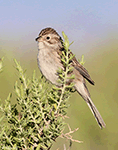 |
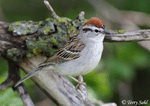 |
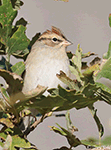 |
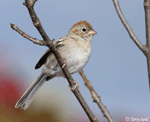 |
| Brewer's Sparrow | Chipping Sparrow | Chipping Sparrow | Field Sparrow |
Bird Feeders:
Will attend feeders for grains, seeds, and breadcrumbs.
Conservation Status:
Surveys hint at a slight decline in recent decades. Reasons are unknown, but they are a fairly common victim of Brown-headed Cowbird parasitism. However, they are still found across a very broad geographic area and are common in parts of their range. The IUCN considers the Clay-colored Sparrow to be a species of "Least Concern".
Further Information:
Photo Information:
May 30th, 2015 - Kingsbury County, South Dakota - Terry Sohl
Additional Photos:
Click on the image chips or text links below for additional, higher-resolution Clay-colored Sparrow photos.
Audio File Credits:
- 1Ian Cruickshank - Recorded in Saskatchewan, Canada on June 21st, 2013. Original recording and information from xeno-canto.
- 2Patrick Turgeon - Recorded in Saskatchewan, Canada on June 10th, 2015. Original recording and information from xeno-canto.
| Click on the map below for a higher-resolution view |
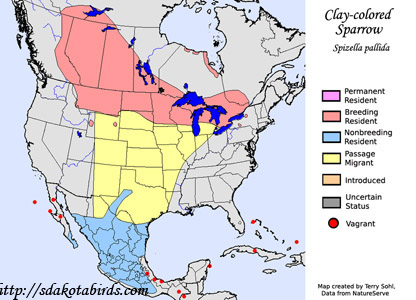 |
| South Dakota Status: Common migrant across the sate. Uncommon summer breeding resident in the northeast and north-central. |
Additional Clay-colored Sparrow Photos
Click for a higher-resolution version of these photos
